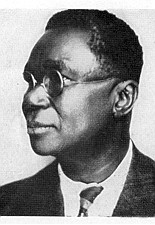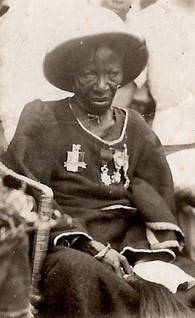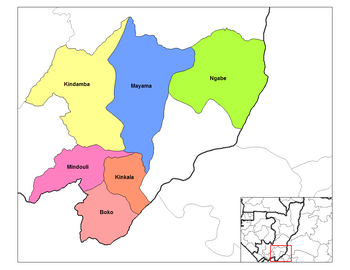
The French Congo or Middle Congo was a French colony which at one time comprised the present-day area of the Republic of the Congo and parts of Gabon, and the Central African Republic. In 1910, it was made part of the larger French Equatorial Africa.

Virunga National Park is a national park in the Albertine Rift Valley in the eastern part of the Democratic Republic of the Congo. It was created in 1925. In elevation, it ranges from 680 m (2,230 ft) in the Semliki River valley to 5,109 m (16,762 ft) in the Rwenzori Mountains. From north to south it extends approximately 300 km (190 mi), largely along the international borders with Uganda and Rwanda in the east. It covers an area of 8,090 km2 (3,120 sq mi).

Pool is a department of the Republic of the Congo in the southeastern part of the country. It borders the departments of Bouenza, Lékoumou, and Plateaux. Internationally, it borders the Democratic Republic of the Congo. It also surrounds the commune district of the national capital, Brazzaville.

Garamba National Park is a national park in the north-eastern Democratic Republic of the Congo covering nearly 5,200 km2 (2,000 sq mi). It is among Africa's oldest parks and was designated a World Heritage Site by UNESCO in 1980 for its protection of critical habitat for northern white rhinoceroses, African elephants, hippopotamuses, and giraffes. Garamba National Park has been managed by African Parks in partnership with the Institut Congolais pour la Conservation de la Nature since 2005.

Salonga National Park is a national park in the Democratic Republic of the Congo located in the Congo River basin. It is Africa's largest tropical rainforest reserve covering about 36,000 km2 or 3,600,000 hectares. It extends into the provinces of Mai Ndombe, Equateur, Kasaï and Sankuru. In 1984, the national park was inscribed on the UNESCO World Heritage List for its protection of a large swath of relatively intact rainforest and its important habitat for many rare species. In 1999, the site has been listed as endangered due to poaching and housing construction. Following the improvement in its state of conservation, the site was removed from the endangered list in 2021.

Abdallah Mohamed Kamil is a Djiboutian politician. He served as the third Prime Minister of the country from 5 February 1978 to 2 October 1978.

The Acacus Mountains or Tadrart Akakus form a mountain range in the desert of the Ghat District in western Libya, part of the Sahara. They are situated east of the city of Ghat, Libya, and stretch north from the border with Algeria, about 100 kilometres (62 mi). The area has a particularly rich array of prehistoric rock art.

The Departments of the Republic of the Congo are divided into 86 districts and 6 communes; which are further subdivided into urban communities and rural communities ; which are further subdivided into quarters or neighborhoods (quartiers) and villages. Note the departments of Brazzaville and Pointe-Noire are made of 1 commune each, then divided in urban districts (arrondissements).

Mantasoa is a municipality in Madagascar. It belongs to the district of Manjakandriana, which is a part of Analamanga Region. The population of the municipality was 10,604 in 2018.

Congo, officially the Republic of the Congo or Congo Republic, also known as Congo-Brazzaville is a country located on the western coast of Central Africa to the west of the Congo River. It is bordered to the west by Gabon, to the northwest by Cameroon, to the northeast by the Central African Republic, to the southeast by the Democratic Republic of the Congo, to the south by the Angolan exclave of Cabinda, and to the southwest by the Atlantic Ocean.
A town in the Republic of the Congo, Mbé is located in the Ngabe District of the Department of Pool, approximately 200 km northeast of Brazzaville. A village in Cameroon, Adamoua region, Vina North

The United Nations Educational, Scientific and Cultural Organization is a specialized agency of the United Nations (UN) with the aim of promoting world peace and security through international cooperation in education, arts, sciences and culture. It has 194 member states and 12 associate members, as well as partners in the non-governmental, intergovernmental and private sector. Headquartered in Paris, France, UNESCO has 53 regional field offices and 199 national commissions.
The archaeological site of Ancient Pap is located on the bank of the Syr Darya River in the Namangan Region of Uzbekistan.

Plon is a French book publishing company, founded in 1852 by Henri Plon and his two brothers.

M'banza-Kongo, is the capital of Angola's northwestern Zaire Province with a population of 148,000 in 2014. M'banza Kongo was the capital of the Kingdom of Kongo since its foundation before the arrival of the Portuguese in 1483 until the abolition of the kingdom in 1915, aside from a brief period of abandonment during civil wars in the 17th century. In 2017, M'banza Kongo was declared a UNESCO World Heritage Site.

Mathurin Anghiley was a Gabonese politician who was elected to the French Senate in 1947. His daughter was the trade unionist Simone Saint-Dénis.
Suʾda, also known as Sa'ada, was a legendary Berber princess who is an important character in the oral epic Al-Sirah al-Hilaliyyah.

Ngalifourou was a queen of the Mbé region in what is today the Republic of Congo (Congo-Brazzaville). As a ruler she was close to French colonial authorities and was the first ruler in her region to sign a treaty with them.
















